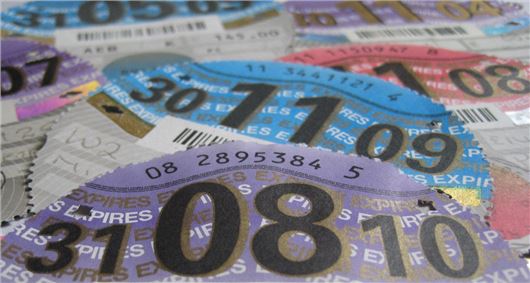Classic road tax explained: Tax bands, 40 year exemption, SORN rules

Despite the fact that the humble tax disc was abolished – amid much controversy – in October 2014, Vehicle Excise Duty (VED) is here to stay. You no longer need a circular piece of paper in the corner of your windscreen, but taxing your classic car is still a reality… and an expensive one for some modern-classic owners.
Most of us already know this. But are we all aware of the latest regulations regarding Statutory Off Road Notification (SORN), the Historic Vehicle taxation class and other crucial areas of VED?
VED: It’s compulsory
If you’re using your vehicle on the road, there’s no getting away from taxing it. Even if your vehicle falls into a taxation class that involves no expenditure (such as the Historic Vehicle class), you still need to tax it. Despite the fact that no money is changing hands, you must still go through the VED process.
Taxation classes and costs
If your vehicle was first registered before 1 March, 2001, its VED rating is determined by its engine size. At the current rates, if your car has an engine of 1549cc or below, you’ll pay £155 per year (or £81.38 every six months); if your engine is larger than 1549cc, you’ll pay £255 per year (or £133.80 every six months). These prices are for a single payment - unlike most other direct debit policies, the DVLA charges you more if you choose to spread the cost.
If your car was first registered on or after 1 March, 2001, its tax rate depends on its CO2 emissions. These range from Band A (up to 100g/km of CO2) to Band M (over 255g/km), attracting costs ranging from zero to £555 per year. However, if your car was first registered before 23 March, 2006, twelve months’ VED will cost you up to £330.75 even for the highest-polluting cars. If you’re thinking of buying a big-engined modern classic, it’s essential that you check its date of first registration as this can drastically affect the cost of VED.
Applying to tax your car can be done online, by phone, or at a VED-issuing Post Office. If you are renewing the tax for a car you already own, you also now have the option to pay monthly by direct debit (rather than ‘up front’ for six or twelve months’ tax); this helps to spread the cost but you’ll incur a 5% extra charge.
You can find out more about the cost of VED for any vehicle via this link: https://www.gov.uk/calculate-vehicle-tax-rates
Buying or selling your car
Car tax is no longer transferrable when you buy or sell a vehicle. There are no exceptions to this, which means that to legally drive home the car you’ve just bought, you need to tax it. You can do this by phone or online at the place of purchase; it’s a simple process, assuming that the V5C – or V5C/2 New Keeper section – is with the car. To tax online, go to: https://www.gov.uk/vehicle-tax
If you’re selling a car that still has at least one complete month of unexpired VED in place, sending off the filled-in V5C (to transfer ownership to your buyer) will trigger an automatic refund to you from the DVLA. This usually arrives (by cheque) within a few days of the DVLA being informed of the change of ownership.
Historic Vehicle taxation class
The Historic Vehicle taxation class is now a ‘rolling’ system once again, meaning that a vehicle that’s 40 or more years old can be reclassified as ‘historic’ and eligible for free car tax (VED). In this instance, it applies to the vehicle’s production date rather than the date of first registration – an important point to bear in mind if you can prove that your particular car sat unregistered for a year or two before hitting the road for the first time.
The rolling system updates occur each April. For example, April 2019 saw all vehicles built prior to 1 January, 1979, become eligible for Historic Vehicle car tax. This means all 1978-produced vehicles could be reclassified. April 2020 will see it update to pre-1980 vehicles and so on.
If your classic is eligible to be reclassified as a Historic Vehicle, go to Section 7 of your V5C and complete the Tax Class section, altering it to ‘historic’. Then sign and date the bottom of that page and take your V5C along to a VED-issuing Post Office, complete with a completed V10 car tax application form and your MoT certificate. The Post Office will issue your car tax free of charge (as a Historic Vehicle) and will send your V5C to the DVLA. You’ll then receive a replacement V5C in the post, plus a cheque for any unexpired (previously paid for) VED.
To SORN or not to SORN?
The introduction of Continuous Insurance Enforcement (CIE) regulations in 2011 had an important effect on Statutory Off Road Notification (SORN). The law now states it is illegal to keep a vehicle taxed if it has no insurance; if your insurance runs out, you cancel it or you switch it to another vehicle, you are now legally obliged to declare your car SORN’d. Just as importantly, even if your car is MoT’d and insured, once its VED expires you must declare it SORN’d if you don’t intend re-taxing it immediately.
To ignore this is to break the law. Fortunately though, arranging SORN for any vehicle is an easy task – and can even be done over the phone, simply by calling 0300 123 4321.
If you prefer to arrange your SORN declaration by post, you can do so by downloading form V890 via this link: https://www.gov.uk/government/publications/v890-statutory-off-road-notification-sorn
If you want to arrange SORN online, you can fill in the relevant details here: https://www.gov.uk/make-a-sorn. You’ll need either the 16-digit reference number from your vehicle tax renewal letter (V11) or the 11-digit reference number from your V5C.
If you fail to declare SORN when necessary, you may be liable to an automatic £80 fine and have to pay any VED that would normally have been due. An important (and welcome) change was introduced in 2013, however, which now means that a SORN declaration lasts indefinitely, with no need for an annual renewal; once you’re ready to tax your vehicle again, you simply do so in the usual way.
Compare classic car insurance quotes and buy online. A friendly service offering access to a range of policies and benefits.


 Paul Guinness
Paul Guinness
 NEC classic motor show 2020 postponed due to Covid 19 concerns
NEC classic motor show 2020 postponed due to Covid 19 concerns
 Classic car auction house Coys goes into administration
Classic car auction house Coys goes into administration
 Motor racing great Sir Stirling Moss dies aged 90
Motor racing great Sir Stirling Moss dies aged 90
 Alfa Romeo anniversary races set for Silverstone
Alfa Romeo anniversary races set for Silverstone
 Government to make E5 fuel available for classic owners
Government to make E5 fuel available for classic owners
 Plans to introduce cleaner fuel could damage more than a million classic cars
Plans to introduce cleaner fuel could damage more than a million classic cars
 Top 10: Classic cars from the Gulf motor racing heritage collection
Top 10: Classic cars from the Gulf motor racing heritage collection


